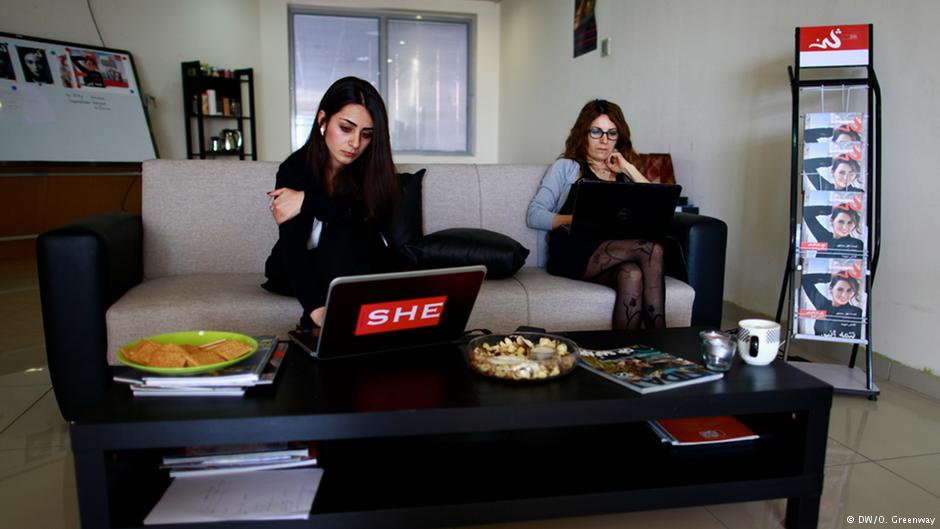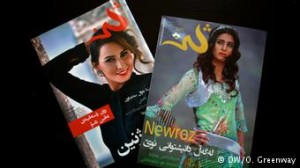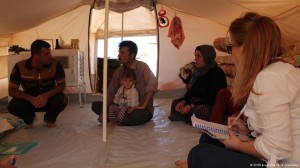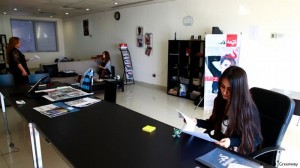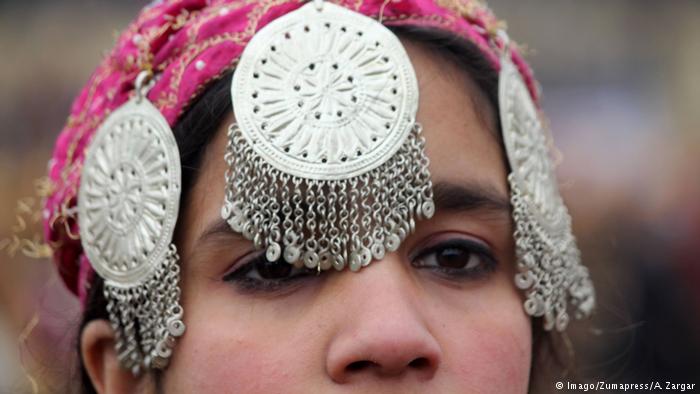Challenging tradition in Iraqi Kurdistan
A number of female journalists in Iraqi Kurdistan are shaking up a male-dominated domain with a magazine that aims to highlight the problems and abuse many women still face. Melissa Tabeek reports from Sulaymaniyah.
In a sparsely decorated but chic space in the northern Iraqi city of Sulaymaniyah, a group of Iraqi Kurdish women are finishing up final drafts of articles, creating publishing schedules and reviewing photos. Editors Koral Noori and Alaa Lattif debate content, while Tafan Najat works on fashion and beauty stories. With the editor-in-chief set to return to the city later that evening, they are preparing for their third issue of ZHIN magazine, a special on marriage, to go to the printers. The three are excited, as the layout has been improving with each issue, they say.
“It is very important to show readers and society what is happening with women here in Kurdistan. They are facing violence, different kinds of abuse, stress, but no one is worried about showing this kind of situation. For us, for ZHIN magazine, every one of the different parts of women’s lives are very important,” Lattif told DW.
Starting a new conversation
From beauty and lifestyle to refugees and social issues, every story and every photo in, ZHIN Magazine – “zhin” means woman in Kurdish – is produced by women, for women, and the operation is managed by women. In a city just over 100 kilometers from the frontlines where Kurdish Peshmerga forces are fighting “Islamic State” (IS) militants and working in the conservative society that is Iraqi Kurdistan, what this group of female journalists are aiming to do is a first.
“Kurdistan is a pretty conservative society, not in its religion, but its culture. Women really have an underprivileged role. [Somehow] much is changing, you see economic growth, shopping malls and buildings but you do not see a change in the mentality. Women still find it hard to find their voices and be heard,” editor-in-chief Brigitte Sins, who works with the NGO International Media Support (IMS), told DW.
“Zhin is pretty unique. The independent media sector is small. There are a few women’s newsletters but it does not have the same effect. Things that are made by women are not respected or seen as professional here,” she continued.
The magazine is part of a project supported by IMS to publish two magazines, ZHIN in Kurdish and Iraqiyat in Arabic. ZHIN targets Kurdish women, while Iraqiyat is focusing on all women in Iraq, but the content of both focuses on and is created solely by women.
Taking on the challenge
The process of finding trained Iraqi Kurdish female journalists presented the first of many challenges for putting together a magazine staff that would be capable of producing a high-quality glossy publication. Sins said it was not only down to a lack of journalism skills because of the scarcity of development opportunities for female journalists, but also because of the small pool of women who are also able to work independently without the burden of social constraints.
“A lot of female journalists are not allowed to travel by themselves or to work in the evening hours or work in an office dominated by men where they are supposed to play the same roles as men. The ones who get through that, they are really the tough ones who are willing to set aside their family life. They choose work over family and it is quite something. If you choose to be a female journalist in this country, it can mean you lose your family. It is quite a radical decision, so it is not even the dangers of working on the front lines, but it has such an impact on your social life and your status in society,” Sin explained.
Conservatism coupled with a media industry dominated by men means creating a sustainable, independent magazine that addresses women’s issues is no small feat. Koral Noori is one of the editors of the magazine and host of a debate show focused on economy and politics on Kurdish News Network (KNN). She says that athough things are better now for women than before, the profession is still not accepted by many in Iraqi Kurdistan’s society, and the opportunities within the industry are limited. But worse than discrimination, says Noori, are harassment and even death threats that have made her work more difficult since she began in 1997, a time when there were few females in the profession.
She mentions a case about an honor killing, where a man had killed two sisters. She and a colleague wrote a story about it and the man sent her a letter from prison threatening her life. “For more than a month and a half, we went home early, we did not go shopping, we did not stay at work a long time because we were afraid. We were young girls, younger than now, we were afraid that if he killed two sisters, he can kill us too,” Noori told DW.
Pushing one boundary at a time
The goal for ZHIN magazine’s staff is ambitious and it begins by testing one boundary at a time, striking a balance between celebrating women’s positive stories, such as successful entrepreneurs, and pushing the envelope with harder and more controversial topics, from female genital mutilation – a widespread practice throughout Kurdistan – to purchasing lingerie, a simple act that remains taboo for most women.
But crossing the line editorially is only one part of it. According to Sins, Lattif and Noori, just the fact that they have an office with only women working inside is already out of the ordinary. When you add having beautiful women portraits on the cover of the magazine, you are saying something without even opening the magazine, Sins says.
All of the women at Zhin and Iraqiyat magazine see the publications as a vehicle to drive change not only with their stories, but using the magazine to build a network and a platform to bring together activists and push civil society forward. Sulaymaniyah, a city known in Iraqi Kurdistan for having the most socially active community, is a good place to start, Noori says.
“One of these things we want to change is the mentality of people and their thinking that journalism is not for women. We are going to show that we are women, we are journalists and we have this magazine, this successful magazine. That is what we want to change first, and from there, we are going to have a role to change other things,” Lattif says.
Sitting on the couch in the magazine’s office, Noori said that with the magazine change is on its way, regardless of the culture of extremism that they witness on a daily basis.
“We want change, how can we change if we are afraid? Really, when you are in the situation you feel afraid or scared. . . but when you think, ‘I need to change my society,’ there is also a cost. If I am a female and I feel what other females in our society feel, their suffering and how the traditional norms and the law are, if I do not do anything for them, who will?”
Author: Melissa Tabeek, Iraqi Kurdistan
WTO RECOMMENDS
FGM: a tradition that remains alive despite international condemnation
Female genital mutilation is still practised in many African countries, despite being officially banned. Girl members of the semi nomadic Pokot ethnic group in Kenya have to undergo the painful ritual.
The face-off between tradition and modernity in India
Indian culture has incorporated a colorful variety of traditions and customs for hundreds of years. Even now, the values and norms of Indian culture play a significant role in Indian society. Especially for women there are more stringent rules, because they symbolize the honor of their families.
Tête-à-tête with tradition and the modern woman
Ace Indian designer Payal Kapoor has a global recognition with her designer brands, “Famous” and “Raj.” Debarati Mukherjee spoke to the designer, who shared her journey down the fashion isle and offered a peek inside her latest collection at the Lakme Fashion Week (LFW) in India.



